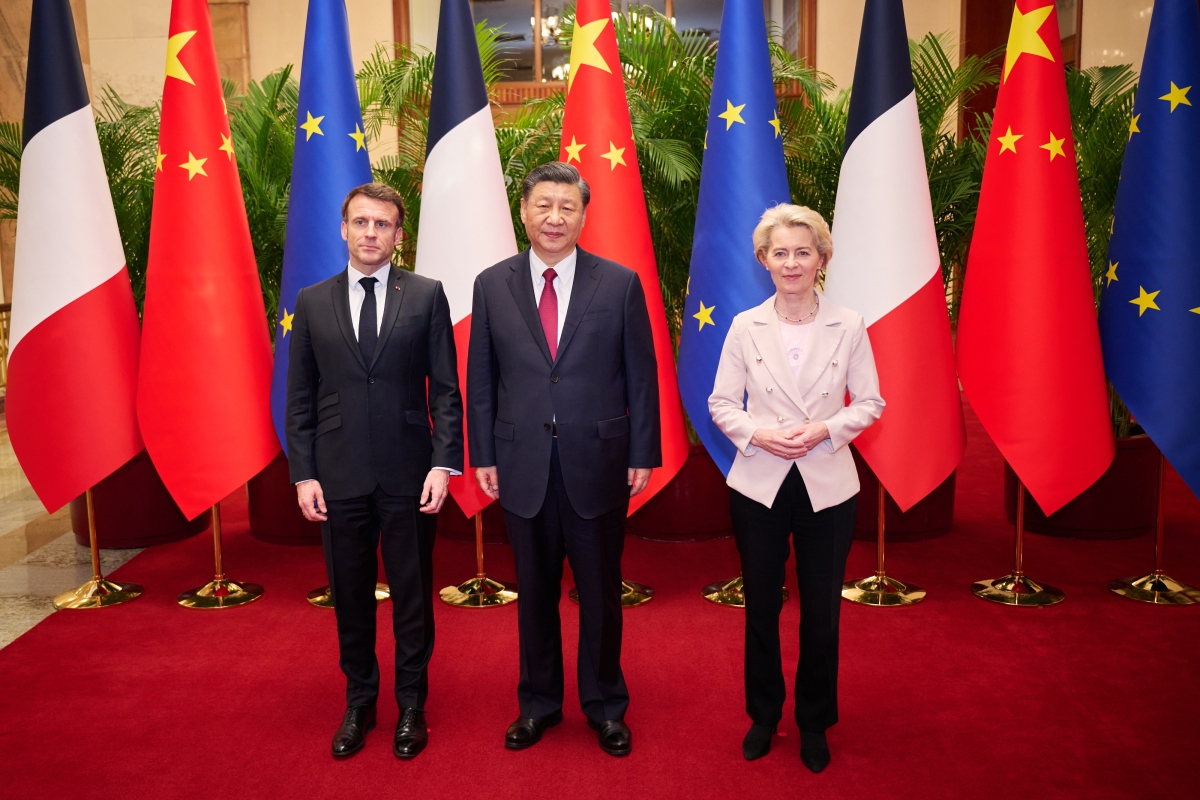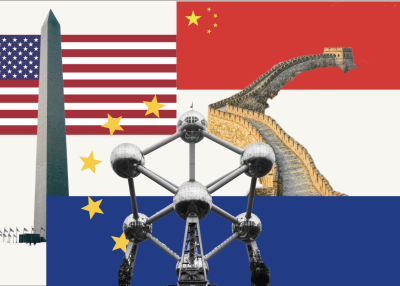Europe-China Relations: From Joint Strategic Agenda to "De-Risking"
An overview by China Macro Group for Asia Society Switzerland

Group photo of Emmanuel Macron, Xi Jinping, and Ursula von der Leyen, during the visit of Ursula von der Leyen, President of the European Commission, and Emmanuel Macron, President of France, to China, 06.04.2023. @ European Union, 2023.
Introduction
As relations between China and the U.S. continue to deteriorate, the debate over Europe's positioning in the conflict has intensified. In a 2019 European Union strategy paper, China was labeled a "partner, economic competitor, and systemic rival" – a significant departure from a decades-long approach that prioritized closer trade and investment ties. In the spring of 2023, EU Commission President Ursula von der Leyen called for a "de-risking" (though not a decoupling) from China. Some European leaders, however, continue to shy away from an approach that would reduce economic and technological engagement between Europe and China. French President Emmanuel Macron, for example, has warned against blindly following Washington down a path of economic containment or isolation of China.
In preparation of our June 26 debate in Zurich on whether Europe should side with the U.S. over China, Asia Society Switzerland collaborated with China Macro Group, a Switzerland-based research and consulting firm specializing in Chinese policy and market analysis, to deliver an overview of Europe-China relations at this crucial moment. The key take-aways are below, and you can download the full analysis here. CMG will also release a more comprehensive primer on this topic later this summer.
Nico Luchsinger, Executive Director, Asia Society Switzerland
Markus Herrmann, Co-Founder & Managing Partner, China Macro Group
Key Take-Aways
1. Economic baseline: Increasing - but increasingly uneven - integration
So far, trade integration between EU and China continues unabated despite the pandemic - both in goods (where China runs a surplus) as well as in services (where the EU runs a small one). FDI stocks have grown considerably in both directions in the last 10 years, though it’s worth noting that after a rapid increase in Chinese outbound FDI flows to Europe up to 2016, Chinese investments in Europe in response to both domestic and international factors have collapsed rapidly. Increasingly, Chinese FDI in Europe comes in the form of greenfield investments instead of M&A deals. (See slides 4 & 7)
- Meanwhile, European FDI in China has rebounded after a 3-year slump – but it is mainly driven by a few big ticket transactions. (Slide 6)
- Germany is the European country with the highest import and export reliance on China, followed by Ireland. The other countries can be split into three groups: high export reliance (Switzerland, Ireland, France, Finland); high import reliance (UK, Poland, Czechia, Netherlands); and low economic interdependence (basically everyone else). (Slide 5)
2. EU and European policy towards China: The securitization of everything
The high water mark for EU-China relations is in 2013-14, when China and EU jointly launch a "strategic agenda for cooperation". Ten years later, the document is remarkable not just for the optimism it exudes, but also for how comprehensive it aimed to be, covering everything from military training to urbanization to student exchanges.
- Soon after, the combination of explicit Chinese industrial policy and a series of high-profile Chinese acquisitions in Europe make China's ambitions clear and lead to a re-assessment in Europe.
- From this point on, the comprehensive partnership of 2013 becomes increasingly fragmented, evidenced by the EU's 2019 "Strategic Outlook", which labels China a partner, competitor, and rival at the same time.
- EU sanctions related to Xinjiang and Chinese sanctions in response further narrow the field for cooperation and dialogue, and put an end to the ambitious Comprehensive Agreement on Investments (CAI), which was envisioned in the 2013 strategic agenda. (Slide 9)
The deterioriation is reflected in summit diplomacy: While the 2018 and 2019 summits still produce joint statements, subsequent editions produce mostly disagreements. At the (virtually held) 2022 summit, the parties can only agree to cooperate on a global biodiversity framework. The EU's top foreign policy official later refers to the gathering as a "dialogue of the deaf". (Slide 10)
- In March 2023, EU Commission President von der Leyen concludes that China is moving into a new era of security and control, which trumps the logic of free market and trade, and that the country is seeking systemic change in the international order ("more repressive at home and more assertive abroad"). She calls for a "de-risking" approach – a concept that is intended to distinguish the EU from American calls for a "de-coupling", but leaves the Chinese side unconvinced.
- Von der Leyen's approach is further complicated by divisions between the EU member states (as evidenced by French President Macron's cordial visit to China immediately after her speech), and within governments (as evidenced by Germany's ongoing debate over its still-to-be-published China strategy). (Slide 11)
3. Switzerland: End of the "special relationship"
Switzerland's relationship with the People's Republic of China was long marked by a pioneering spirit: From the early recognition of the PRC to the sino-foreign joint venture to the comprehensive free trade agreement and early Swiss support for the multilateral development bank AIIB initiated by China.
- But the strategic competition between China and the U.S., and the more confrontational China policy of the EU, increase costs for a pragmatic China policy in Switzerland.
- Additionally, Switzerland's parliament and public become increasingly concerned with human rights and ESG topics, as well as alleged influence operations.
The Federal Council's 2021 China Strategy acknowledges the singular foreign policy relevance of China, and tries to find middle ground: It clearly acknowledges human rights issues and China's ambitions, and global non-convergence, but continues to advocate for engagement with China and collaboration where possible. (Slide 12)
4. Chinese policy towards Europe: The continuity of continuity
In the face of marked shifts in European China policy, China continues to project continuity in its approach to Europe, emphasizing the strategic importance and its desire to collaborate across different areas. (Slide 14)
- China is interested in Europe achieving "strategic autonomy" (instead of having a strong transatlantic alignment), as well as maintaining and expanding access to the European market and technologies.
- Subsequent white papers on the EU over 15 years see little changes, though China increasingly focuses on global governance reforms, and asserts its own principles for collaborations. (Slide 15)
China continues to focus on bilateral relationship with EU member states, trying to maintain constructive relations, and manage issues individually. (Slide 16)
Download the full analysis by China Macro Group here.


